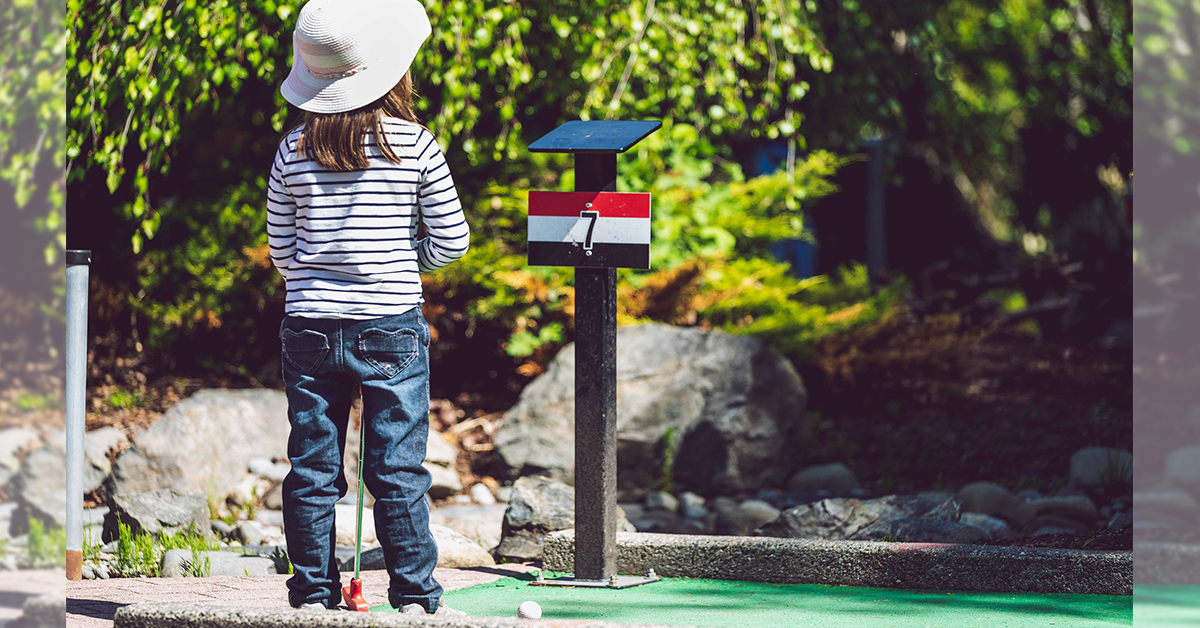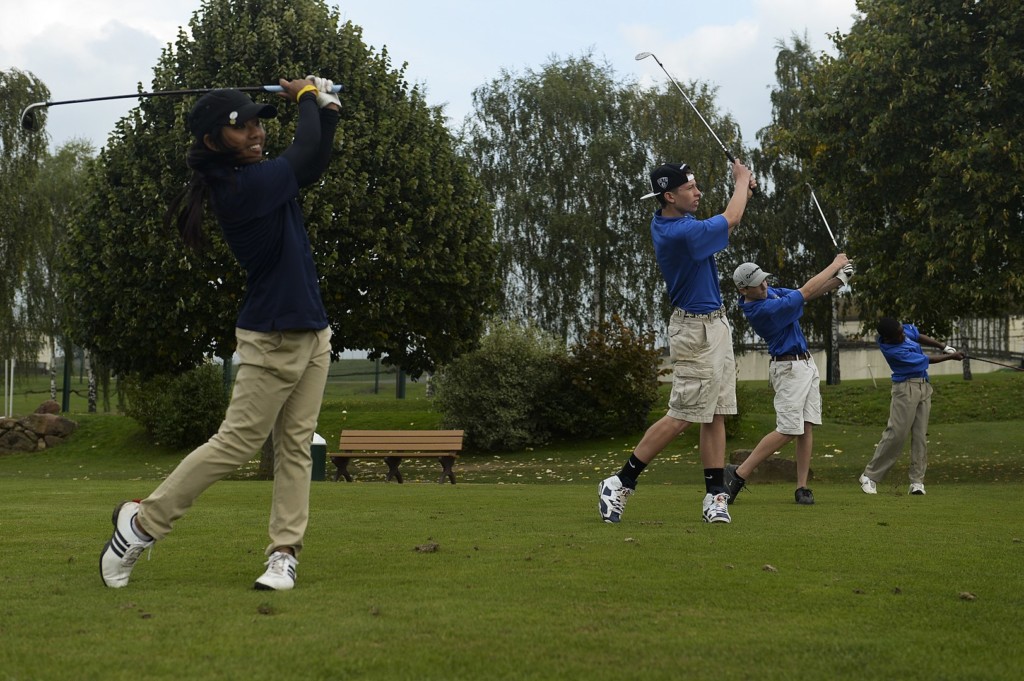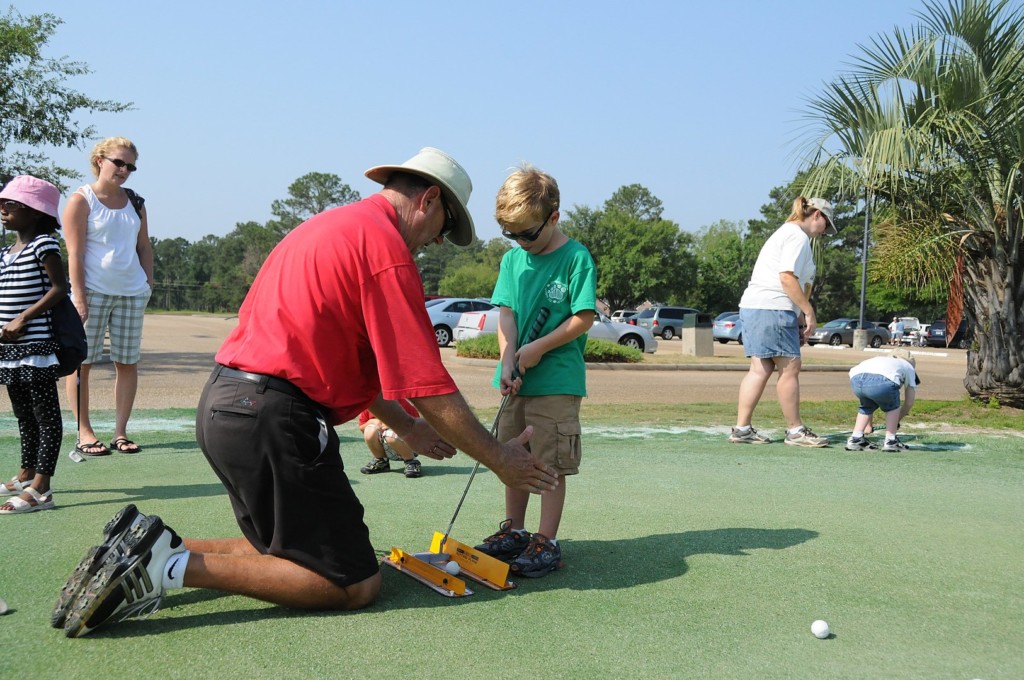“No one will ever have golf under his thumb. No round ever will be so good it could not have been better. Perhaps this is why golf is the greatest of games. You are not playing a human adversary; you are playing a game. You are playing old man par.” – Ben Hogan
It’s the beauty of golf. It’s a game you can always become better at. You can learn and have fun at the same time. While some sports are stressful and can make you hate it, golf is different. It’s educational, recreational, and independent. It’s challenging, but in the end, you have one goal in mind: To get the ball in the hole in as few strokes as possible. By learning just the basics, you will find yourself scoring birdies in no time.
But golf is more than just a game; it’s a chance to become better at life. It teaches you a lot of lessons, from how to think and make good decisions to how practice can make you skillfully better. It can teach you happiness as well as how to deal with frustration and the importance of learning from mistakes. Yes, you will make mistakes as a golfer. Even the world’s number player, Rory McIlroy, does. As a parent, one of the best investments you can make for your child is getting them into the sport. There are so many rewards.
In this article, we will look at the best age to invest in golf lessons as well as the advantages of getting lessons, how to look for an instructor, and what children will learn as a result of practicing golf.
What’s the Best Age To Start Lessons?
There is no “A child has to start golf lessons at age (fill in the blank).” All children are different. They advance their skills at different ages and find their drive and motivation in various stages of their life. Tiger Woods was picking up a golf club at two years old and showing the world his professional swing on “The Michael Douglas Show” while Bubba Watson developed later and never took a lesson in his life. Watson learned the game purely on his own.
First and foremost, understand that most every child is not Tiger Woods. If you push them to be like Tiger Woods at 18 months old, they may learn to hate the game before they start preschool. Children should learn the game at an age when they’re most comfortable and when they are most interested.
Golf should be fun for the child, not exhausting and frustrating. Let them enjoy it and learn at the same time. Eighteen-time major champion Jack Nicklaus once said, “I’m a firm believer in the theory that people only do their best at things they truly enjoy. It is difficult to excel at something you don’t enjoy.” In other words, golf is about having fun. Your children need to enjoy it. Let them have fun and develop a love for it.
In the past as a parent, you had to sign your child up for private lessons first to see if they enjoyed the game and had the skill set to go further. It’s still a great idea to do that. But there’s also the beauty of technology where you can bring golf in your home first to your child. You can buy them a Nintendo Wii and have them practice in a video game setting, or you can purchase a golf net for the outdoors and watch YouTube videos that teach them pure basics.
If you have the money, you can go out and get a simulator like Trackman that you can set up in your home. After developing some basics, they can go to a Tour Pro to help them further develop their skills in a more one-on-one or group format.
The best age? Again, understand that all children develop at different ages. But it would be most ideal to get a child lessons sometime before they turn 10 years old. This gives them several years to learn and develop different skills before entering high school. In high school, they can begin competing against other golfers and start making a name for themselves. With success comes scholarships and the opportunity to take the game to the NCAA level which then opens up possibilities for more competition, amateur tournaments, and possible eyes on the Korn Ferry and PGA Tours.
But let’s slow down a bit. There are still a lot of questions that need to be answered before we are playing a Masters round with Tiger Woods.
What are the Advantages of Playing Golf?
Golf is different from team sports. You can be great at basketball or baseball but still lose games. Golf all depends on how good YOU are. For some children, they like the independence and responsibility of their own play dictating their success.
Besides the independence of golf, there are many other advantages to playing:
1. The Exercise
You get in good shape playing golf. That should go without saying. You not only use your muscles in a golf swing, you walk a lot! Many times when children are taking lessons, they will play rounds of golf and walk 18 holes. There’s no better cardio than that. It gets you in shape just as much as running a mile every day. It keeps you thin as well.
Additionally, it’s low impact. In other words, you’re not getting hit or getting hurt. Eventually, as you play a lot, you may gain a few strains here and there and your feet may start hurting, but you’re not breaking bones like you would in other sports. You’re only making your muscles stronger by utilizing them day in and day out on the golf course.
2. Social Experience
While it’s true that golf is an individual and independent sport, it doesn’t mean you do it all on your own. Many times lessons are with other students and you gain friendships with other young golfers that have similar interests in you. It also allows you to meet someone who you can play golf with so you don’t have to go out on your own all the time. There, you can help each other and have fun together.
3. Mental Strength
Bobby Jones once said, Golf is a game that’s played on a five-inch course–the distance between your ears.” Golf may seem all physical, but the fact is it’s more mental than anything. Some may argue it’s the most mentally challenging sport of any out there. You always have to think about the course, and in order for you to become really good, you have to concentrate hard.
Have you ever watched a golf tournament and see players absolutely exhausted after 18 holes? It has nothing to do with physical exhaustion most of the time. They are mentally exhausted. Playing golf will make your mind stronger and that can go a long way in helping you with other aspects of your life. Plus, it teaches you how to accept mistakes and learn from them.
4. Easy to Learn
Don’t take this the wrong way too much now. The game is easy to learn, yes, but difficult to master. That being said, the best part about golf is the early stages because you can see yourself improve a lot within the first couple months of taking lessons, and that feeling is so good inside. Some may say it’s the one sport that keeps you wanting to come back for more. When you hit a good shot, it feels so good inside and you want to learn more.
5. It’s Fun!
It’s a game where you try and get a little ball into a hole. If you’re a competitive person, you will love it. Children love to have fun and play games, and golf is just that. It can be frustrating when you’re not playing well, but as you get better, it becomes more fun. It’s also carefree, relaxing (until you get into tournaments), and recreational.
How to Find an Instructor
As a parent, again, the advantage of technology can help you find the best instructor for your child. By searching online, you can look up instructors near you and even see comments on their teaching as well as their overall resume. However, never commit to an instructor right away. You should always try one out first and see how it works out.
Some things you will want to look for in the right instructor:
1. Chemistry
This goes for anything in life, whether it be a doctor, a therapist, a coach, a teacher, or a golf instructor: you want to find an instructor that develops a good chemistry with your child.
According to Golf Digest, there are two key components: The personality piece and the communication piece. The personality piece focuses on the child having fun. Families aren’t spending money to bore a child to death. There’s an entertainment piece to it, and a good instructor makes the game fun for the child.
The second key piece is the communication piece. A good instructor communicates the right information so one will develop the right way. Knowledge is key and you want to find an instructor who knows their stuff and communicates their stuff effectively.
2. A Good Track Record
This is your resume piece. You want to find an instructor that has a good background and is knowledgeable about the golf swing. Most instructors will have a Professional license where they can teach students and will have gone through the grueling challenges of tournaments and may even have professional experience on the PGA Tour.
Again, this is where technology comes in handy. You can many times find YouTube videos on these instructors and read information about them online by searching for them on Google. Many websites even have rankings for individual instructors. Also, don’t go out of your regional limits. You probably don’t want to find an instructor in Ohio if you live in Florida; be sure to search for instructors that are local or at least in your own state.
3. Have Patience
If an instructor passes steps one and two on our list, number three becomes very important. Understand that progress isn’t shown overnight. It takes time and lots of practice. A good instructor provides children the right tools to improve their game, but then it’s up to the child to practice and utilize those tools. If they just go for lessons but don’t practice in their free time, progress may be hard to come by.
According to Ohio golf instructor Kyle Morris, it takes confidence and competence to succeed. It takes some time to feel comfortable doing something new. You need to give it time to go from the uncomfortable to a comfortable stage.
4. Know Your Goals
Do you want to learn just the basics? Do you want to learn just the short game? Do you want the full package? These are instrumental in knowing before you begin your golf lessons. This must be communicated to the instructor so they know where to focus their time on with you.
According to Morris, you want to develop a child to the point where they don’t need you. Everything you teach them sinks in, and when they make mistakes, they know the golf swing well enough to know how to fix it on their own. This is when you know they have taken it to the advanced stage. The goal of the instructor is to get them to that stage.
How Much Do Lessons Cost?
On average, your typical golf lesson with a Tour Professional will cost anywhere between $30 to $70. Each instructor is different in what they charge, though. Understand that the more successful an instructor has been and the better their resume, the more they will cost.
That being said, sometimes lower-priced instructors are really good. They are maybe just starting out or may not have a lot of tournament experience but they know the game better than the best of them. It all goes back to choosing the right instructor. Never commit to an instructor, but feel free to try them out and see how they connect with your child. Many new instructors are very motivated and will work hard to teach your child.
Prices also depend on where you live. For most states, $30 to $70 is average, but states with higher costs of living like California and New York will likely cost closer to $100 or more. So keep that in mind when searching for an instructor.
The Final Verdict
There are only advantages to getting your child into golf. You are improving your child socially, physically, and mentally all at the same time. As a parent, you will become proud of your child as they develop and see improvements in their game with time.
Get them started early so they can see if this something that could develop into a future sport for them. Robin Sharma once said, “You can’t win if you don’t try.” Get your child into golf. See where it leads them. There are no risks involved, only advantages.





